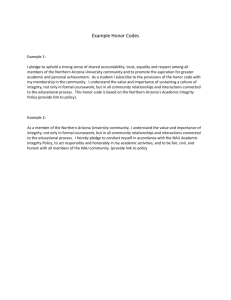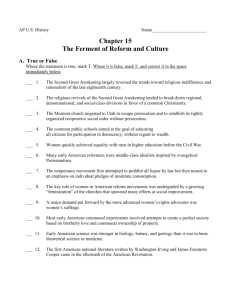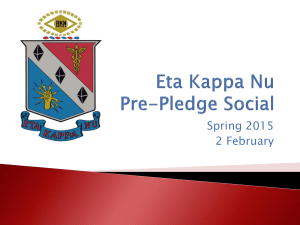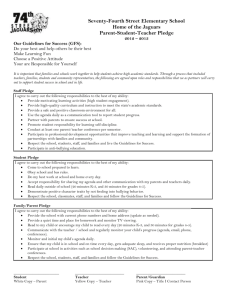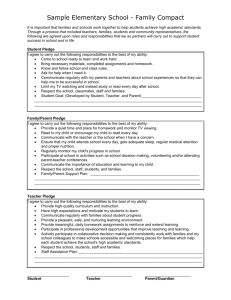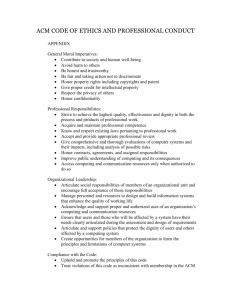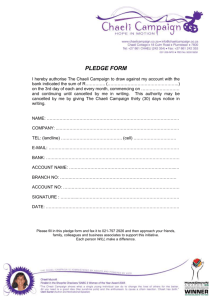Chapter 15 Packet Notes - North Penn School District
advertisement
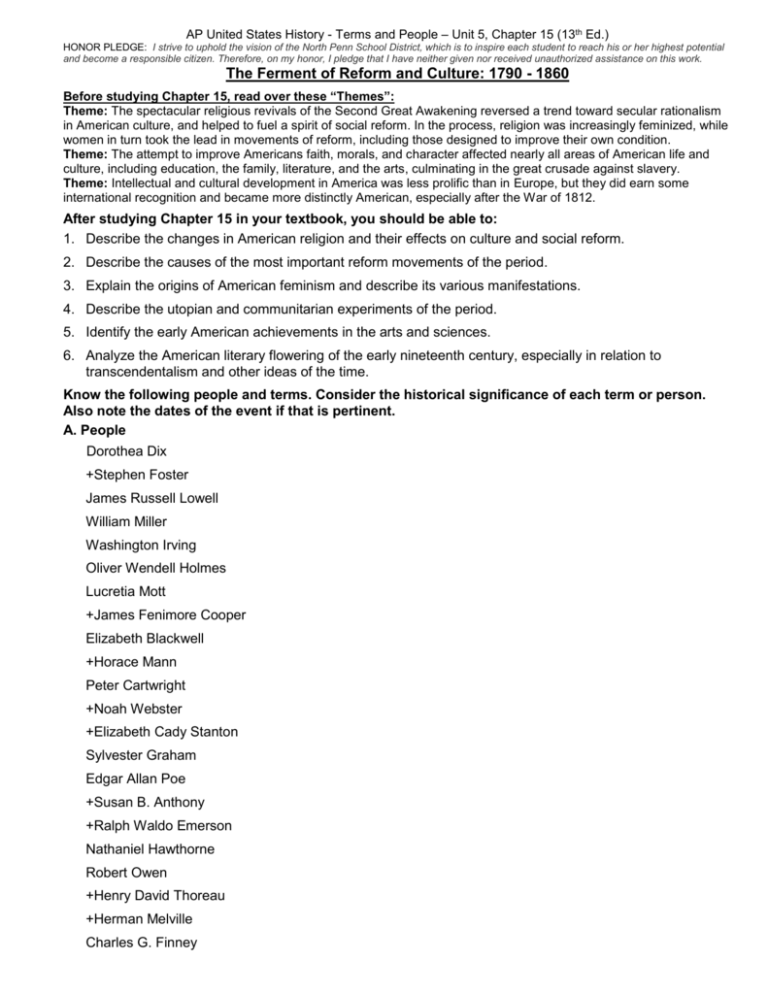
AP United States History - Terms and People – Unit 5, Chapter 15 (13th Ed.) HONOR PLEDGE: I strive to uphold the vision of the North Penn School District, which is to inspire each student to reach his or her highest potential and become a responsible citizen. Therefore, on my honor, I pledge that I have neither given nor received unauthorized assistance on this work. The Ferment of Reform and Culture: 1790 - 1860 Before studying Chapter 15, read over these “Themes”: Theme: The spectacular religious revivals of the Second Great Awakening reversed a trend toward secular rationalism in American culture, and helped to fuel a spirit of social reform. In the process, religion was increasingly feminized, while women in turn took the lead in movements of reform, including those designed to improve their own condition. Theme: The attempt to improve Americans faith, morals, and character affected nearly all areas of American life and culture, including education, the family, literature, and the arts, culminating in the great crusade against slavery. Theme: Intellectual and cultural development in America was less prolific than in Europe, but they did earn some international recognition and became more distinctly American, especially after the War of 1812. After studying Chapter 15 in your textbook, you should be able to: 1. Describe the changes in American religion and their effects on culture and social reform. 2. Describe the causes of the most important reform movements of the period. 3. Explain the origins of American feminism and describe its various manifestations. 4. Describe the utopian and communitarian experiments of the period. 5. Identify the early American achievements in the arts and sciences. 6. Analyze the American literary flowering of the early nineteenth century, especially in relation to transcendentalism and other ideas of the time. Know the following people and terms. Consider the historical significance of each term or person. Also note the dates of the event if that is pertinent. A. People Dorothea Dix +Stephen Foster James Russell Lowell William Miller Washington Irving Oliver Wendell Holmes Lucretia Mott +James Fenimore Cooper Elizabeth Blackwell +Horace Mann Peter Cartwright +Noah Webster +Elizabeth Cady Stanton Sylvester Graham Edgar Allan Poe +Susan B. Anthony +Ralph Waldo Emerson Nathaniel Hawthorne Robert Owen +Henry David Thoreau +Herman Melville Charles G. Finney AP United States History - Terms and People – Unit 5, Chapter 15 (13th Ed.) HONOR PLEDGE: I strive to uphold the vision of the North Penn School District, which is to inspire each student to reach his or her highest potential and become a responsible citizen. Therefore, on my honor, I pledge that I have neither given nor received unauthorized assistance on this work. William H. McGuffey Emma Willard Louis Agassiz +Walt Whitman John J. Audubon Henry Wadsworth Longfellow Louisa May Alcott Gilbert Stuart Margaret Fuller Francis Parkman +Joseph Smith +Brigham Young +Phineas T. Barnum +=One of the 100 Most Influential Americans of All Time, as ranked by The Atlantic. Go to Webpage to see all 100. B. Terms: Deism polygamy theocracy utopian communitarian transcendentalism American Temperance Society Shakers Maine Law of 1851 Unitarian Second Great Awakening Hudson River school Women’s Rights Convention Knickerbocker group Burned-Over District Declaration of Sentiments Millerites Oneida Community Mormons C. Sample Essays: Using what you have previously learned and what you learned by reading Chapter 15, you should be able to answer essays such as these: 1. What role did women play in the intellectual and literary movements of the early 1800’s? 2. In what ways did the American literature in the early nineteenth century reflect the “New Democracy “of the Jacksonian age? AP United States History - Terms and People – Unit 5, Chapter 15 (13th Ed.) HONOR PLEDGE: I strive to uphold the vision of the North Penn School District, which is to inspire each student to reach his or her highest potential and become a responsible citizen. Therefore, on my honor, I pledge that I have neither given nor received unauthorized assistance on this work. D. Voices from the past: I desire you would remember the ladies and be more generous to them than your ancestors…all men would be tyrants if they could. Abigail Adams, in a letter to her husband John in 1776 In education, in marriage, in religion, in everything, disappointment is the lot of women. Lucy Stone, 1855 Trust thyself: every heart vibrates to that iron string…. Whose would be a man, a man must be a non-conformist. Ralph Waldo Emerson, “Self-Reliance” (1841) If a man does not keep pace with his companion, perhaps it is because he hears a different drummer. Henry David Thoreau I come to present the strong claims of suffering humanity. I come to place before the Legislature of Massachusetts the condition of the miserable, the desolate, the outcast. I come as the advocate of helpless, forgotten, insane men and women; of beings sunk to a condition from which the unconcerned world would start with real horror . Dorothea Dix, from her Memorial to the Legislature of Massachusetts, 1843 F. Matching People, Places, and Events: Match the person, place or event in the left column with the proper description in the right column by placing the correct letter on the blank line. _____1. Dorothea Dix _____2. Brigham Young _____3. Elizabeth Cady Stanton _____4. Lucretia Mott _____5. Horace Mann _____6. John J. Audubon _____7. Charles G. Finney _____8. Robert Owen _____9. John Humphrey Noyes _____10.Mary Lyon _____11.Louisa May Alcott _____12.James Fenimore Cooper _____13.Emily Dickinson _____14.Ralph Waldo Emerson _____15.Walt Whitman _____16.William Gilmore Simms _____17.Edgar Allan Poe _____18.Herman Melville A. Leader of a radical New York commune that practiced “complex marriage” and eugenic birth control. B. Bold, unconventional poet who celebrated American democracy C. The “Mormon Moses” who led persecuted Latter-Day Saints to their promised land in Utah D. Influential evangelical revivalist of the Second Great Awakening E. New York writer whose romantic sea tales were more popular than his dark literary masterpiece, Moby Dick F. Believed tax-supported public schools was essential for social stability and democracy G. Pioneering women’s educator, founder of Mount Holyoke Seminary in Massachusetts H. Idealistic Scottish industrialist whose attempt at a communal utopia in America failed I. Author of magnificently illustrated Birds of America J. Second-rate poet and philosopher, but first-rate promoter of transcendentalist ideals and American culture K. Eccentric “southern” genius whose tales of mystery, suffering and the supernatural departed from general American literary trends. L. Quietly determined reformer who substantially improved conditions for the mentally ill M. Reclusive New England poet, who wrote about love, death and immortality N. Leading feminist who wrote the “Declaration of Sentiments” in 1848 and pushed for women’s suffrage O. Most noteworthy southern novelist before the Civil War P. Novelist whose tales of family life, such as Little Women, helped economically support her own struggling transcendentalist family Q. Path-breaking American novelist who contrasted the natural person of the forest with the values of modern civilization R. Quaker women’s rights advocate who also strongly supported the abolition of slavery AP United States History - Terms and People – Unit 5, Chapter 15 (13th Ed.) HONOR PLEDGE: I strive to uphold the vision of the North Penn School District, which is to inspire each student to reach his or her highest potential and become a responsible citizen. Therefore, on my honor, I pledge that I have neither given nor received unauthorized assistance on this work. E. Matching Cause and Effect: Match the historical cause in the left column with the proper effect in the right column by writing the correct letter on the blank line. Cause Effect ____ 1. The Second Great Awakening A. Created the first literature genuinely native to America B. Captured in one long poem the exuberant and ____ 2. The Mormon practice of polygamy optimistic spirit of popular American democracy C. Caused most utopian experiments to decline or ____ 3. Women abolitionists’ anger at being collapse in a few years ignored by male reformers D. Inspired writers like Ralph Waldo Emerson, Henry David Thoreau and Margaret Fuller ____ 4. The women’s rights movement E. Aroused hostility and scorn in most of the male press and pulpit ____ 5. Unrealistic expectations and conflict F. Made their works little understood in their lifetimes by within perfectionist communities generally optimistic Americans G. Aroused persecution from morally traditionalist ____ 6.The Knickerbocker and transcendentalist Americans and delayed statehood for Utah use of new American themes in their writing H. Inspired a widespread spirit of evangelical reform in many areas of American life ____ 7. Henry David Thoreau’s theory of civil I. Led to expanding the crusade for equal rights to disobedience include women J. Inspired later practitioners of nonviolence like ____ 8. Walt Whitman’s Leaves of Grass Mahatma Gandhi and Martin Luther King, Jr. ____ 9. Herman Melville’s and Edgar Allan Poe’s concern with evil and suffering ____10. The Transcendentalist movement G. Can You Identify? Match the person, place or event in the left column with the proper description in the right column by placing the correct letter on the blank line. _____ 1. Transcendentalism A. Liberal religious belief, held by many of the Founding Fathers, that stressed rationalism and moral behavior rather than Christian revelation _____ 2. Leaves of Grass B. Religious revival that began on the frontier and swept eastward, stirring an evangelical spirit in many areas of American life. _____ 3. Mormons C. The two religious denominations that benefited from the evangelical revivals of the early nineteenth century. _____ 4. Deism D. Religious group founded by Joseph Smith that eventually established a cooperative commonwealth in Utah. _____ 5. The Scarlet Letter E. 1848 meeting in New York where women made an appeal based on the Declaration of Independence. _____ 6. civil disobedience F. Commune established in Indiana by Scottish industrialist Robert Owen. _____ 7. Second Great Awakening G. Intellectual commune in Massachusetts based on “plain living and high thinking.” _____ 8. Seneca Falls Convention H. Thomas Jefferson’s stately self-designed home in Virginia that became a model of American architecture _____ 9. Methodists and Baptists I. Philosophical and literary movement, centered in New England, that greatly influenced many American writers of the early 19th century _____10. New Harmony J. The doctrine, promoted by American writer Henry David Thoreau in an essay of the same name, that later influenced Gandhi and King _____11. Brook Farm K. Walt Whitman’s shocking collection of emotional poems L. A disturbing New England masterpiece about adultery and guilt in _____12. Monticello the old Puritan era. After this Unit is done, detach the next page and save it for the course review at the end of the year. AP United States History - Terms and People – Unit 5, Chapter 15 (13th Ed.) HONOR PLEDGE: I strive to uphold the vision of the North Penn School District, which is to inspire each student to reach his or her highest potential and become a responsible citizen. Therefore, on my honor, I pledge that I have neither given nor received unauthorized assistance on this work. Comparing and Contrasting: The First and Second Great Awakening When 1730s and 1740s Where 13 colonies Leaders Jonathon Edwards First Great Awakening Impact “New Lights,” ministers who believed in the revitalization of the Great Awakening, attacked old style, orthodox clergy – “Old Lights” George Whitefield Emphasized direct, emotive spirituality Strengthened the Baptists First spontaneous mass movement of the American people When Where Leaders 1800s to 1840s Mainly along the “frontier’ regions of the new country, particularly western New York, Pennsylvania, Virginia and the Carolinas Peter Cartwright Second Great Awakening Impact Furthered the fragmentation of religious faiths Tended to denounce slavery and alcohol Charles Emphasized the importance of women in the church Grandison and in the family Finney (save this page for review at the end of the year)
